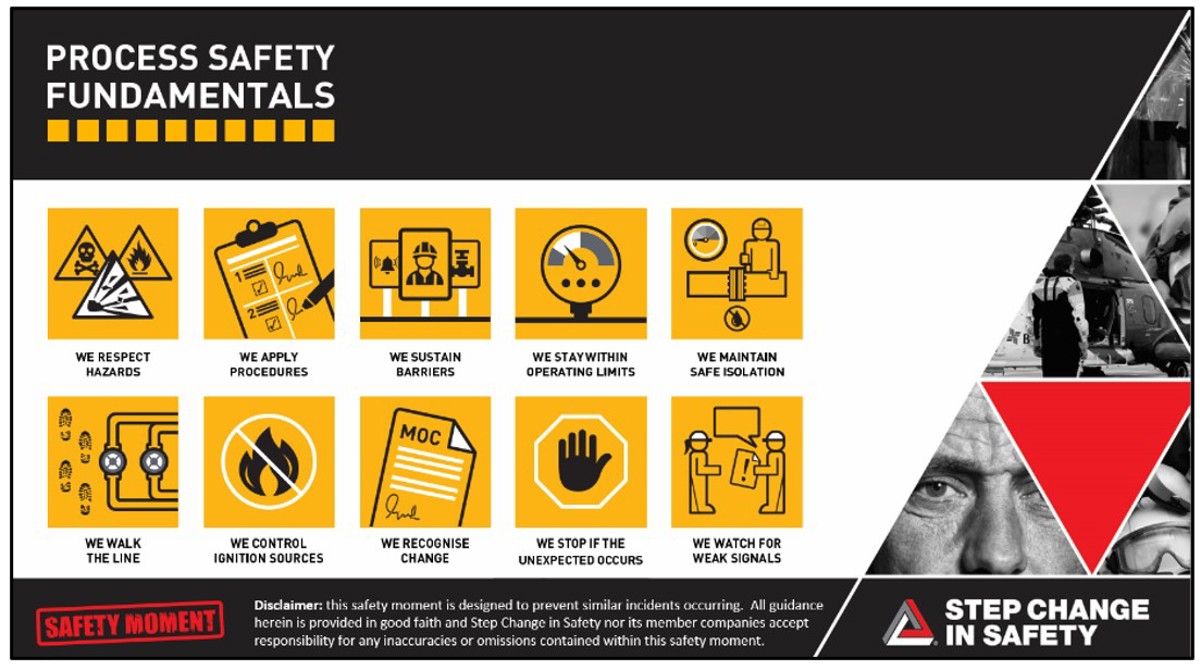Process Safety Fundamentals – IOGP / Step Change
- Safety Flash
- Published on 12 May 2022
- Generated on 24 April 2025
- IMCA SF 12/22
- 2 minute read
Jump to:
Step Change in Safety has created a “Safety Moment” based on IOGP’s Process Safety Fundamentals with the inclusion of relevant incident examples.
Intro 1
hilst not all of the incidents occurred within our industry, the learnings remain applicable. The Step Change Safety Moment pack can be downloaded here and can be used during safety meetings or as individual sheets for toolbox talks.

The principles outlined, and some basic pointers from within the material, are here as a reminder, with an emphasis on the final three:
- We respect hazards – incident investigations identify lack of hazard awareness as an underlying cause of many process safety events.
- We apply procedures – we use operating and maintenance procedures, even if we are familiar with the task.
- We sustain barriers – we speak up when barriers don’t feel adequate.
- We stay within operating limits – we discuss and use the approved limits for our location.
- We maintain safe isolation -we raise isolation concerns before the task starts and challenge when isolation plans cannot be carried out.
- We walk the line – we physically confirm the system is ready for the intended activity.
- We control ignition sources – we minimize and challenge ignition sources even in “non-hazardous” areas.
- We recognise change
- We look for and speak up about change.
- We discuss change and involve others to identify the need for management of change.
- We discuss and seek advice on change that occurs gradually over time.
- We stop if the unexpected occurs
- We discuss the work plan and what signals would tell us it is proceeding as expected.
- We pause and ask questions when signals and conditions are not as expected.
- We stop and alert our supervisors if the activity is not proceeding as expected.
- We watch for weak signals
- We proactively look for indicators or signals that suggest future problems.
- We speak up about potential issues even if we are not sure they are important.
- We persistently explore the causes of changing indicators or unusual situations.
IMCA Safety Flashes summarise key safety matters and incidents, allowing lessons to be more easily learnt for the benefit of the entire offshore industry.
The effectiveness of the IMCA Safety Flash system depends on the industry sharing information and so avoiding repeat incidents. Incidents are classified according to IOGP's Life Saving Rules.
All information is anonymised or sanitised, as appropriate, and warnings for graphic content included where possible.
IMCA makes every effort to ensure both the accuracy and reliability of the information shared, but is not be liable for any guidance and/or recommendation and/or statement herein contained.
The information contained in this document does not fulfil or replace any individual's or Member's legal, regulatory or other duties or obligations in respect of their operations. Individuals and Members remain solely responsible for the safe, lawful and proper conduct of their operations.
Share your safety incidents with IMCA online. Sign-up to receive Safety Flashes straight to your email.